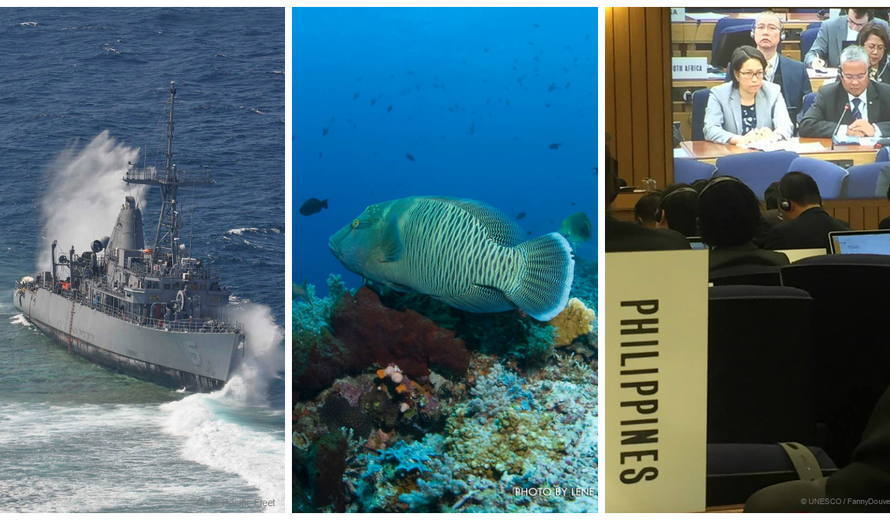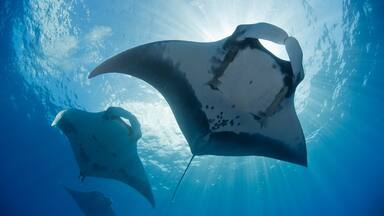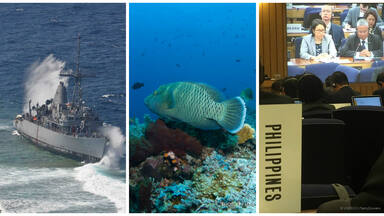Tubbataha Reefs protected from international shipping impacts
The Tubbataha Reefs Natural Park (Philippines) has been officially designated as a Particularly Sensitive Sea Area (PSSA)—and an “area to be avoided”—by the International Maritime Organization. The endorsement is a major breakthrough, as it will require international vessels to avoid the World Heritage site, reducing the impact of noise and pollution, and decreasing the risk of future ship groundings. This is the result of years of collaboration between the IMO and the Government of the Philippines, with the support of UNESCO’s World Heritage Marine Programme.
Like all World Heritage sites, Tubbataha Reefs Natural Park has been recognized by the international community for its Outstanding Universal Value. Its pristine coral reefs, lagoons and coral islands span almost 100,000 hectares, and support whales, dolphins, turtles, birds, and 500 species of fish.
Tubbataha lies at the junction of the two shipping routes that traverse the Sulu Sea. These corridors connect the West Philippine Sea to the Celebes Sea in the south and to the Pacific Ocean on the eastern border of the Philippines. With shipping still the most cost-effective way to transport cargo around the world, activity is likely to increase in the coming years.
The International Maritime Organization (IMO) is the United Nations specialized agency with responsibility for the safety and security of shipping and the prevention of marine pollution by ships. One of the IMO’s roles is to protect areas of ecological, socio-economic or scientific significance from potential harm caused by international shipping. It does this by designating Particularly Sensitive Sea Areas (PSSA). When an area is approved as a PSSA, at least one protective measure must be put in place to manage maritime activities in that area. These might include routing measures, strict marine pollution and equipment requirements, installation of Vessel Traffic Services, or designation of an Area to Be Avoided, as at Tubbataha Reefs Natural Park.
In 2013, two grounding incidents involving a US warship and a Chinese fishing vessel ruined more than 6,000 square meters of coral reefs in the park. These incidents highlighted Tubbataha’s vulnerability, but concern about shipping impacts in the park predates those groundings. In 2011, the World Heritage Committee, in Decision 35COM 7B.17, urged the Philippines to expedite its application for special protection for the Sulu Sea.
Over the next several years, the World Heritage Centre’s Marine Programme worked closely with the Government of the Philippines and the IMO to establish this PSSA—the first in Southeast Asia. In 2012, the World Heritage Centre provided funding to pursue the application, enabling the Tubbataha Management Office to organize a technical workshop that would lead to the official submission of the dossier. After years of planning and preparation, the Tubbataha Reefs Natural Park received an “in principle” approval as a PSSA in 2016. Earlier this month, the designation received official confirmation at the IMO Marine Environmental Protection Committee meeting. The designation will take effect on January 2018 after a six-month period of notifying the global shipping industry.
Today World Heritage sites comprise, or protect waters adjacent to, six of the 15 PSSAs (and 2 PSSA extensions) worldwide, including: Papahānaumokuākea (USA), Malpelo Fauna and Flora Sanctuary (Colombia), Galápagos Islands (Ecuador), Everglades National Park (USA), Wadden Sea (Denmark, Germany, Netherlands) and the Great Barrier Reef (Australia). The World Heritage Centre’s Marine Programme is currently providing support to help Banc d’Arguin National Park in Mauritania secure PSSA designation for the Park and adjacent waters.





